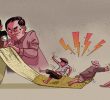In my previous study, the daily cost of living for a family of six in August 1999 was pegged at P455.82 ($9.30) in the National Capital Region (NCR). For areas outside NCR, the daily cost of living was P353.49 or $7.21 (for agricultural areas) and P371.92 or $7.59 (for non-agricultural areas).
In August 2006, NWPC data showed that the family living wage in NCR amounted to P756 ($15.42). For families outside NCR, the family living wage was P662.93 ($13.52) on the average.
Indeed, these data quantify how low past and current wage rates are.
Debunking the Claims
Then again, those who are against a substantial wage hike could argue that massive retrenchment and closure of establishments would happen once workers� wages are increased. Even data from the DOLE, however, would show that from 1996 to 2000, the main reasons for the permanent closure and retrenchment are reorganization/downsizing/redundancy, lack of capital, high cost of production, lack of market, peso depreciation and financial losses.
Through the years, not even one percent of establishments cited as reason the �minimum wage rate increase.� The data show that the closure and retrenchment can be rooted in the economic crisis besetting the country, and not the wage increases � little as they are � that have been granted through the years.
As regards the inflationary nature of wage hikes, studies show that wages only account for 10 percent of the cost of production on the average. Taking into account the average minimum wage amounting to P290.73 ($5.93), a P125 ($2.55) nationwide wage increase represents a 43 percent increase in nominal wages.
This means that the increase in production cost as a result of the legislated wage hike will only be 4.3 percent which will not result in inflation unless the capitalists opt not to decrease their profits a little.
Those against a legislated wage hike also lose sight of the fact that an increase in purchasing power of the workers is beneficial to the economy. A vibrant economy, after all, needs people who can buy goods and services in order to help increase the demand for such.
Clearly, defending a substantial wage increase � and a legislated one at that � is not just merely a result of one�s bleeding heart for the impoverished but has compelling empirical data that are interpreted in a way that seriously considers the rights and welfare of workers. Bulatlat










